The SaaS market has been growing steadily in recent years, driven by the benefits of cloud-based software solutions such as scalability, flexibility, and cost-effectiveness. The COVID-19 pandemic has further accelerated the adoption of SaaS solutions, as remote work and digital transformation have become critical priorities for many businesses. As a result, the SaaS market is expected to continue to grow at a significant pace in the coming years, with more and more businesses adopting cloud-based solutions to drive innovation, streamline operations, and improve efficiency.
According to a recent report, The global Software as a Service (SaaS) market size is projected to grow from $251.17 billion in 2022 to $883.34 billion by 2029, at a CAGR of 19.7%
Now, this grooming industry is, by default, increasing the competition as well. For one specific service, there are thousands of options. Do you need project management software? There are hundreds. No matter what services you are providing, I must say that there are a lot of competitors in your SaaS category as well.
So, it’s important to make your product stand out from the rest by giving it unique features that could attract customers. Additionally, focusing on excellent customer service and building a strong brand reputation can also help your SaaS stand out in a crowded market, and to do so, you need strong marketing tools to make it seamless and cost-effective. Marketing tools can help you increase your revenue quickly. Let’s understand SaaS marketing in detail.
What is SaaS Marketing?
SaaS marketing refers to the strategies and tactics used to promote and sell software-as-a-service (SaaS) products. SaaS marketing is focused on reaching and engaging potential customers through various channels, such as social media, email marketing, content marketing, search engine optimization (SEO), pay-per-click (PPC) advertising, and more.
SaaS companies often use a subscription-based pricing model, which requires a different approach to marketing than traditional software products. The focus of SaaS marketing is on building long-term relationships with customers by providing ongoing value and support. This involves a deep understanding of the target audience, their pain points, and the benefits that the SaaS product can provide.
Successful SaaS marketing also involves tracking and analyzing metrics such as customer acquisition cost (CAC), customer lifetime value (CLTV), churn rate, and conversion rates. By constantly refining their strategies based on these metrics, SaaS companies can improve their marketing efforts and grow their customer base over time.
SaaS Marketing Tools and Platforms to Increase Your Revenue
Some of the strong marketing methods include social media advertising, email marketing, and search engine optimization. By utilizing these methods effectively, you can reach a wider audience and ultimately drive more sales. These tools will help you achieve your marketing goal faster.
HubSpot: HubSpot is an all-in-one inbound marketing platform that includes features such as lead generation, social media management, email marketing, and analytics. HubSpot provides a range of features for SaaS companies, including:
- Lead generation: HubSpot includes tools for creating landing pages, forms, and calls-to-action to capture leads from website visitors.
- Social media management: HubSpot allows SaaS companies to manage their social media accounts, schedule posts, and track engagement metrics.
- Email marketing: HubSpot provides a range of email marketing tools, including customizable email templates, automated campaigns, and email analytics.
- Analytics: HubSpot includes a range of analytics tools for tracking website traffic, lead generation, and marketing campaign performance.
Marketo: Marketo is a marketing automation platform that helps SaaS companies automate and streamline their marketing campaigns, including email marketing, lead management, and analytics. Marketo provides features such as:
- Lead management: Marketo allows SaaS companies to manage leads and automate lead nurturing campaigns based on customer behavior and engagement.
- Email marketing: Marketo includes email marketing features such as customizable templates, automated campaigns, and email analytics.
- Analytics: Marketo provides a range of analytics tools for tracking campaign performance, website traffic, and lead conversion rates.
Hootsuite: Hootsuite is a social media management platform that allows SaaS companies to manage multiple social media accounts, schedule posts, and track engagement metrics. Hootsuite provides features such as:
- Social media management: Hootsuite allows SaaS companies to manage multiple social media accounts, schedule posts, and track engagement metrics.
- Social listening: Hootsuite includes tools for monitoring brand mentions, industry trends, and customer feedback on social media.
- Brand monitoring: Track and review what people are talking about your product on social media platforms
- Analytics: Hootsuite provides a range of analytics tools for tracking social media engagement, audience demographics, and campaign performance.
Mailchimp: Mailchimp is an email marketing platform that allows SaaS companies to design and send customized email campaigns, manage subscriber lists, and track campaign performance. Mailchimp features are:
- Email marketing: Mailchimp includes customizable email templates, automated campaigns, and email analytics.
- Audience management: Mailchimp allows SaaS companies to manage subscriber lists, segment audiences, and personalize email content.
- Landing pages: Mailchimp includes tools for creating landing pages to drive lead generation and conversion.
- Subscription forms: Create engaging forms from hundreds of pre-built formats and maximize your subscription rate.
Google Analytics: Google Analytics is a web analytics tool that provides SaaS companies with insights into website traffic, user behavior, and conversion rates. Google Analytics provides features such as:
- Website traffic analysis: Google Analytics allows SaaS companies to track website traffic, user behavior, and conversion rates.
- Audience insights: Google Analytics provides audience demographics, interests, and behavior data to help SaaS companies understand their audience.
- Conversion tracking: Google Analytics allows SaaS companies to track conversion rates and identify opportunities for optimization.
Ahrefs: Ahrefs is an SEO tool that helps SaaS companies improve their search engine rankings by analyzing competitor data, conducting keyword research, and monitoring backlinks. This SEO tool provides features such as:
- Keyword research: Ahrefs includes a range of tools for conducting keyword research, identifying search trends, and analyzing competitor data.
- Site audit: Ahrefs provides a site audit feature to identify technical SEO issues and opportunities for optimization.
- Backlink analysis: Ahrefs allows SaaS companies to analyze backlinks to their website and monitor competitor backlinks to identify opportunities for improvement.
- Compare historical data: With Ahrefs, it’s possible to specify an exact date when working with historical data. This opens up the space for a handful of actionable use cases.
- Competitors Research: See your competitors’ top-performing pages globally and find the backlink they are getting from.
Intercom: Intercom is a customer messaging platform that allows SaaS companies to communicate with customers through chat, email, and other channels, and track customer interactions and behaviors. The platform provides below features:
- Messaging: Intercom allows SaaS companies to communicate with customers through chat, email, and other channels.
- Customer data: Intercom provides customer data such as user behavior, engagement, and preferences to help SaaS companies personalize messaging.
- Automation: Intercom includes automation features to help SaaS companies automate customer communication and engagement.
- Outbound Messages: Use targeted email, mobile push, and in-app messages to encourage customers to take action, or convert visitors to loyal customers.
- Product Tours: As a SaaS product, you have to explain product features when they first-time login to their account. Intercom helps you to onboard and support customers, and highlight new features with guided, adoption-driving tours. Build Tooltips and Checklists seamlessly into your tours.
- There are such 20+ features that Intercom offers.
Drift: Drift is a conversational marketing platform that uses AI-powered chatbots to engage website visitors and generate leads. Drift features are:
- Chatbots: Drift uses AI-powered chatbots to engage website visitors and drive lead generation.
- Personalization: Drift allows SaaS companies to personalize messaging based on user behavior, preferences, and engagement.
- Analytics: Drift provides analytics tools to track chatbot performance, user behavior, and conversion rates.
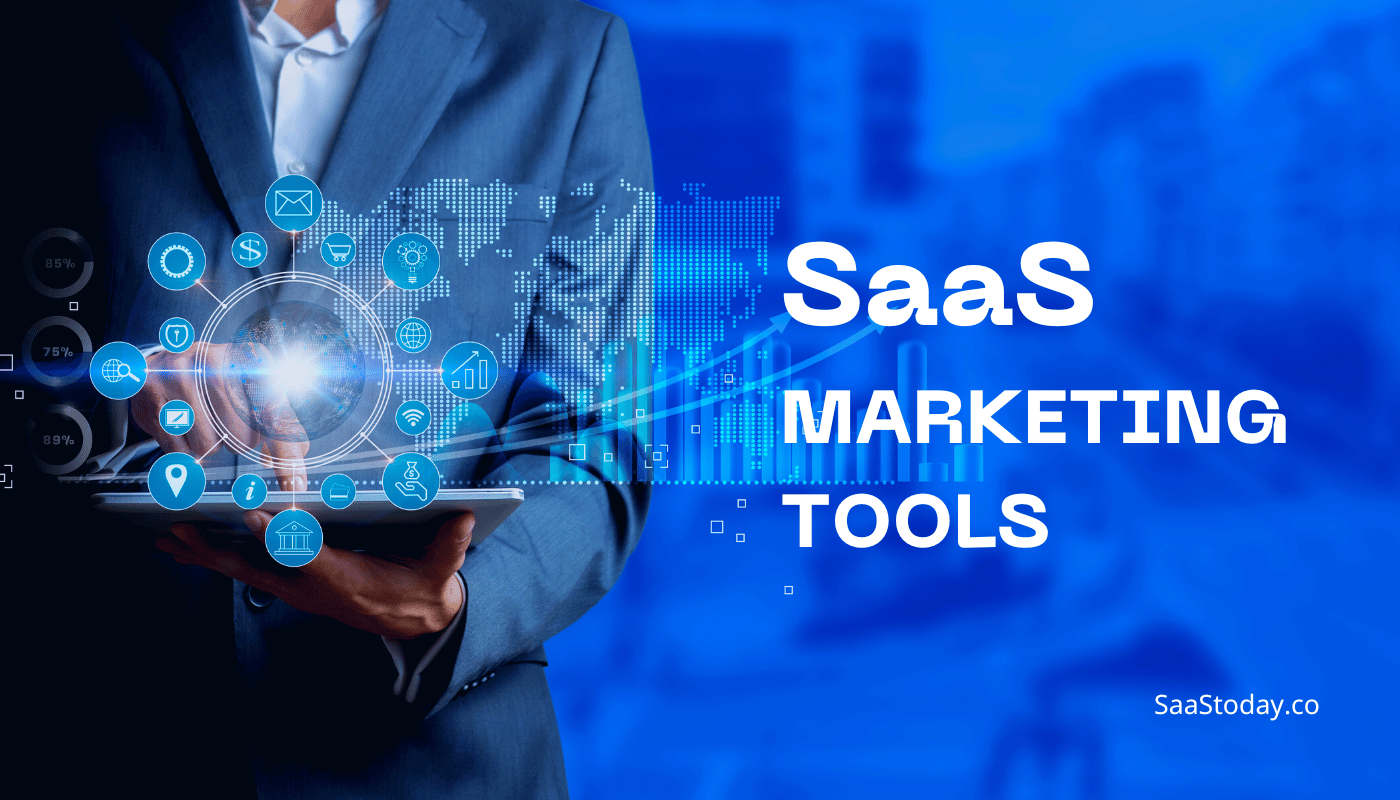
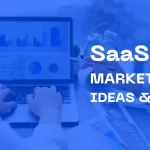

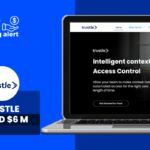
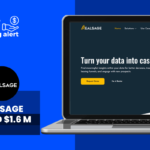
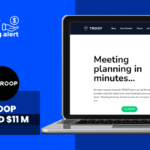
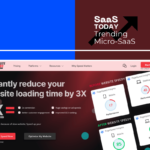
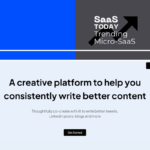







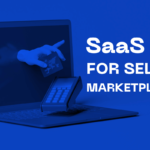



[…] Provide clear and concise information about their qualifications, experience, and expertise in a particular topic or field. This information can be included in an “About Us” or “Author Bio” section on the website. See one example here- SaaS marketing tools […]